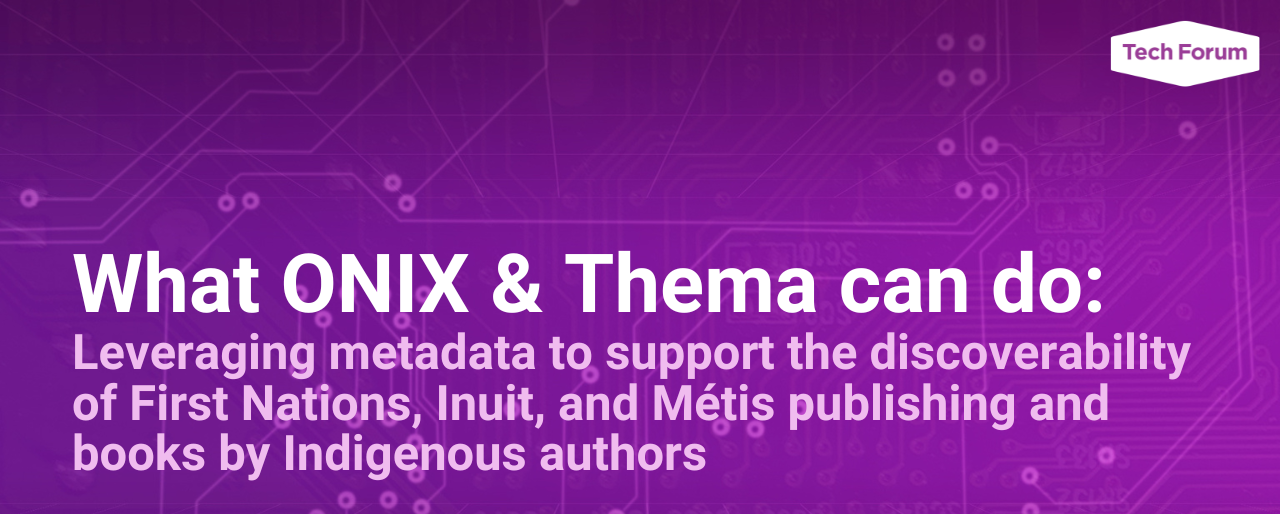This blog post continues a series where we'll demonstrate how to highlight diverse book content using the Thema subject classification system, which is overseen by EDItEUR, the international standards organization that also oversees the ONIX for Books metadata standard. You can review our blog coverage of Thema here, learn more about the basics here, and follow this series here.
Thema: real life examples
In 2020, EDItEUR released a comprehensive report on how to use Thema to communicate what we’ll call “diversity” attributes about a book. This was followed by what EDItEUR refers to as “worked examples,” where EDItEUR took real books in the market and made suggestions as to specific Thema subject categories and qualifiers that could be assigned to describe the book’s content. We're republishing these examples to show how flexible and adaptive Thema is, and to illustrate the effectiveness it offers as a solution to communicate so-called “diversity” attributes about the book's content.
Note: They do not necessarily represent the actual codes chosen by the publishers. They're meant to stimulate discussion and reflection rather than being authoritative statements of the correct way to categorize the particular books listed.
Where possible, we’ve complemented EDItEUR’s examples with Canadian titles and categorized accordingly. The same caveats apply and are worth repeating: The BookNet-selected codes do not necessarily represent the actual codes chosen by the publishers, and they're meant to stimulate discussion and reflection rather than being authoritative statements of the correct way to categorize the particular books listed.
Example: River in an Ocean: Essays on Translation edited by Nuzhat Abbas (trace press)
According to emerging not-for-profit publisher trace press, “these luminous texts by poets, writers, and translators invite us to consider translation as a form of ethical and political love — one that requires attentive regard of an other — and a making and unmaking of self” and moves “across genres, memories, belongings, and borders.” Not stopping there, the book welcomes readers to consider, “What are the histories, constraints, and possibilities of language in relation to bodies, origins, land, colonialism, gender, war, displacement, desire, and migration?”
This timely and necessary work offers a consideration of how translation fits into the larger literary conversation and is a book that weaves through multiple subject categories.
Publisher-provided keywords:
Translation
Decolonial
Feminism
Global South
Migration
Queer
Transnational
Publisher-provided BISAC subjects:
BIOGRAPHY & AUTOBIOGRAPHY / Women
LANGUAGE ARTS & DISCIPLINES / Translating & Interpreting
LITERARY COLLECTIONS / Essays
Publisher-provided Thema subjects:
Translation and interpretation
Literary essays
Feminism and feminist theory
As you can see, there's robust publisher support for keywords, BISAC, and Thema, while maintaining focus: No more than three BISACs or Thema subjects have been selected, which is perfectly within the recommendations and Best Practice, and there’s a beautifully restrained set of keywords. There are additional Thema codes that the publisher may have found appealing that align with the keywords provided (such as code GTS which refers to “Decolonisation of knowledge / Decoloniality”), but we are confident that the book is well-placed given the alignment between the assigned BISAC and Thema codes. The focus of this blog, therefore, will be on opportunities for the book, namely for adding additional layers of discovery through the use of qualifiers.
In Thema, qualifiers “refine the meaning of the subject categories.” Let’s see if we can add meaning by using them. Referring to the notes for EDItEUR’s online Thema browser:
Use INTEREST 5 Qualifier codes WITH appropriate subject codes for: indicating a variety of characteristics relating to the main content of the particular work. 5A age codes to qualify Y codes, 5H to indicate content about a particular holiday or event, 5L to indicate content about a particular age group / generation, 5P to indicate content about a particular grouping of people, etc. National extensions (i.e. 5-xx- format codes, where ‘xx’ indicates a country code) can be assigned by any user, and are not exclusive to users in the indicated country. All 5 codes must be used to describe a main content or topic of the work. DO NOT USE: as a marketing target audience code, the 5 Qualifier must relate to the main content of a work.
With that helpful instruction in mind, let’s review some possible qualifiers.
Theoretical accompanying qualifiers:
5PBC - Relating to migrant groups / diaspora communities or peoples / groups with shared heritage
Accompanied by:
1A - World and/or
1QFG - Global South / Developing countries
Rationale:
Understanding more about River in an Ocean, it considers translation as a radical act considering place, and I wondered if the 5PBC qualifier “Relating to migrant groups / diaspora communities or peoples / groups with shared heritage” would be appropriate. Again, referring to the notes for EDItEUR’s online Thema browser:
Use all 5PBC codes for: material where the major or principal themes, topics or storylines relating to, or from the perspectives of, or about, (historical and recent) diverse groups of people or persons who have migrated or were exiled or displaced from one part of the world to another; or are part of a diaspora community and who maintain a strong and distinct identity and cultural shared heritage associated with another geographical or cultural area within their present place of residence.
Acknowledging the publisher would have to determine if 5PBC was indeed an appropriate selection, there's an additional note in EDItEUR’s online Thema browser:
Use all 5PBC codes with: PLACE 1 Qualifiers as appropriate, to indicate the geographical area that is the subject of the work, usually where that group is now, for example, a title about Syrian migrant communities in Sweden, use with 1DNS, or a title about Guatemalan migrant workers in Mexico, use with 1KLCM or a study of German exiled writers of the mid-twentieth century, in the USA, use with 1KBB.
It must be acknowledged that there may not be a single place one could select from the list of “place” qualifiers which would be appropriate: the book examines translation as a transnational effort, as confirmed by the publisher’s keyword selection. One could consider using place qualifier 1A to indicate a specifically global context, but the publisher would have to consider the scope of the texts contained within the book to validate this suggestion. Or the publisher could use place qualifier 1QFG to refer to the “Global South / Developing countries”. While “Global South” was a publisher-provided keyword, the 1QFG’s code does supplement that term with the potentially divisive term “developing countries” and may not be appropriate.
In the case of River in an Ocean, the publisher’s work on their subject categorization was truly best in class and leaves few opportunities for improvement.
Want more worked examples?
To read more examples as they are posted, subscribe to our weekly eNews or nab the RSS feed.















James Christie on today’s business climate and its effects on the implementation of sustainable, inclusive practices.